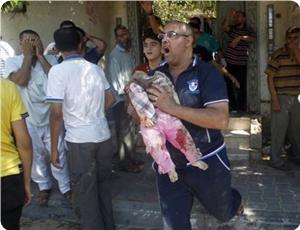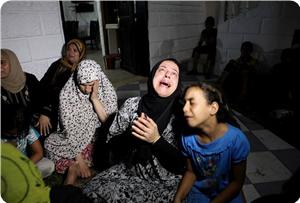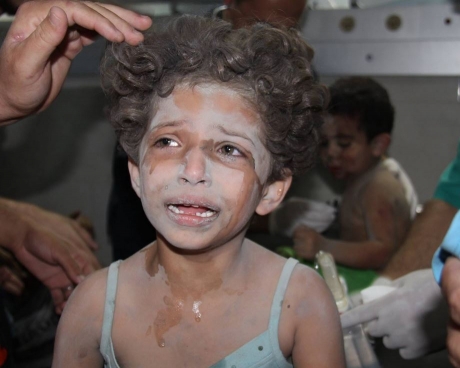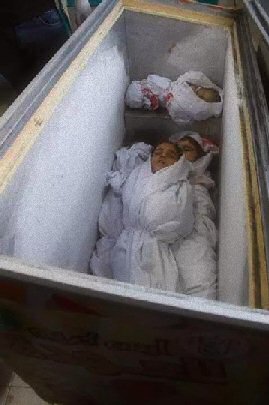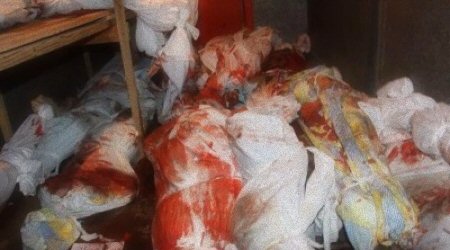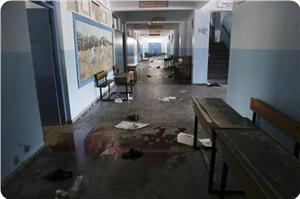www.aljazeerah.info
News, October 2014
Archives
Mission & Name
Conflict Terminology
Editorials
Gaza Holocaust
Gulf War
Isdood
Islam
News
News Photos
Opinion Editorials
US Foreign Policy (Dr. El-Najjar's Articles)
www.aljazeerah.info
|
Editorial Note: The following news reports are summaries from original sources. They may also include corrections of Arabic names and political terminology. Comments are in parentheses. |
Evidence Accumulating on Israeli War Crimes in Gaza, the Hannibal Directive
By Maayan Lubell and Nidal Al-Mughrabi
Editor's Note:
All of Israeli attacks on the Palestinian people in Gaza Strip, killing thousands of civilians, particularly children, women, and elderly, are war crimes and crimes against humanity.
The Israeli criminal war on Gaza Strip in 2014 resulted in killing more than 2,143 people, mostly civilians, and injuring over 11,000. It also resulted in total or partial destruction of 18,000 homes, 75 schools, many hospitals, mosques, and hundreds of factories and shops.
The authors of the following news story point to a specific Israeli war crime due to an Israeli policy known as the Hannibal Directive.
Readers can read more about it in the Gilad Atzmon article published here at Al-Jazeerah:
***
|
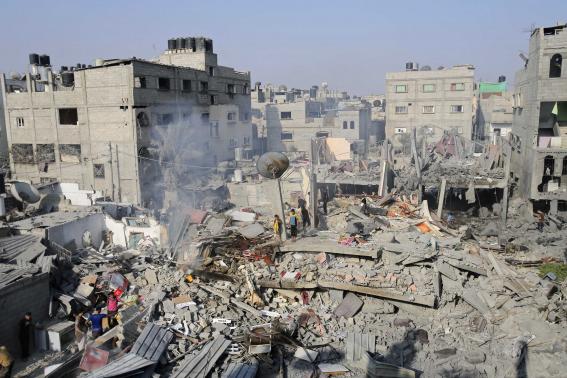 |
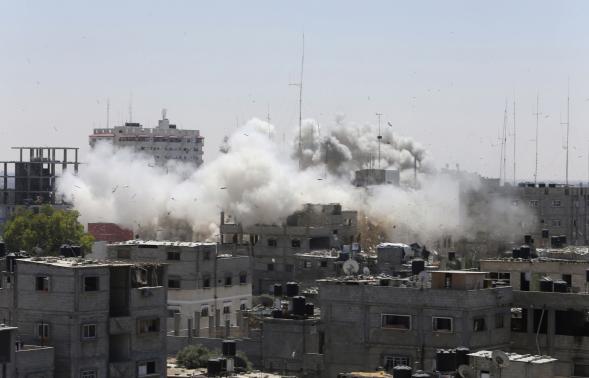 |
|
Palestinians stand on what witnesses say was a house destroyed by an Israeli air strike in Rafah, southern Gaza, in this August 2, 2014 |
Smoke rises following what witnesses said were Israeli air strikes in Rafah in southern Gaza in this August 1, 2014 file photo |
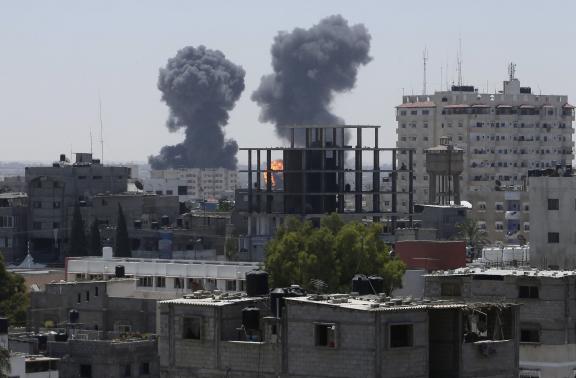 |
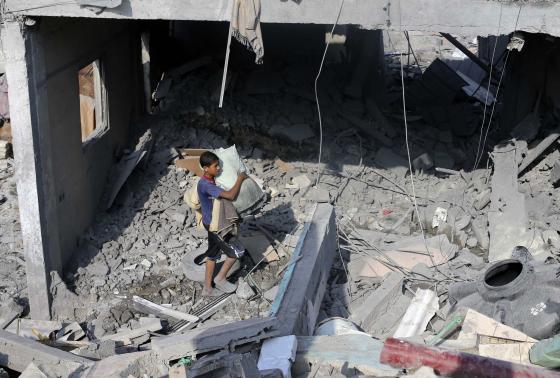 |
|
Smoke and flames are seen following what witnesses said were Israeli air strikes in Rafah in southern Gaza in this August 1, 2014 |
A Palestinian carries belongings from a house, which witnesses said was hit by an Israeli air strike, in Rafah, southern Gaza, in this August 2, 2014 |
Did Israel's 'Hannibal directive' lead to a war crime in Gaza?
By Maayan Lubell and Nidal al-Mughrabi
KEREM SHALOM Israel/GAZA
Mon Oct 13, 2014 4:47am EDT
(Reuters) -
The July-August Israeli war on Gaza drew international condemnation for a number of reasons, but one episode proved more deadly than any other: an Israeli air and artillery bombardment on August 1 that killed 150 people in a matter of hours.
Six weeks on from the war, with the toll of destruction still being counted, there is deepening unease about what took place that day, especially over whether too much force was used. Some legal experts say a war crime may have been committed.
The events unfolded just as a three-day ceasefire was supposed to come into force. Hamas militants emerged from a tunnel inside Gaza and ambushed three Israeli soldiers, killing two of them and seizing the third.
To rescue the soldier - dead or alive - and ensure Hamas could not use him as a hostage, the Israeli army invoked what is known as the "Hannibal directive", an order compelling units to do everything they can to recover an abducted comrade.
What ensued was a furious assault on a confined area on the eastern edge of Rafah, the largest city in southern Gaza, home to around 200,000 people. Israeli artillery and tanks bombarded four neighborhoods for several hours - at times firing a shell a minute - while fighter jets carried out air strikes.
As well as the 150 people killed, medics in Gaza said around 200 were wounded, the majority civilians. It was the deadliest day of the seven-week conflict, in which more than 2,100 Palestinians, again most of them civilians, were killed, as well as 67 Israeli soldiers and six civilians in Israel.
In the weeks since, civil rights campaigners, international legal experts and some Israeli military officers have raised concerns about the assault. One specific reservation is whether the abduction of a single soldier could have justified such heavy and relentless use of force in a populated area.
A panel set up by the United Nations' Human Rights Commission is due to start investigating potential abuses in the war by both sides shortly, with Rafah one of several incidents investigators have indicated they will examine.
Israel's Military Advocate General, the army's chief legal body, has opened its own probe into the events and has said it could launch a criminal investigation. International legal scholars have raised red flags over the justification.
"If it is a legitimate military target then we've got to question if the damage and death done to civilians was proportionate," said Iain Scobbie, a professor of public international law at the University of Manchester.
"In this case the answer is clearly no, it is not proportionate," he said, adding: "If it's not a legitimate military target, it's clearly a war crime because it is an unjustified use of force with effects on the civilian population."
The Israeli military said the advocate-general's fact-finding teams were still working to establish precisely what happened and as a result it would not comment on specifics.
But in a statement the Israel Defence Forces (the Israeli name for the Israeli occupation forces, IOF) said: "There is no (IOF) directive or procedure which allows for a violation of international law, including the law of armed conflict."
AUGUST 1
Mediators in Cairo had agreed with Israeli and Hamas representatives that a ceasefire would begin at 0800 local time.
It is not clear what time Hamas attacked - Hamas at first said it was before the ceasefire started, Israel said it was after - but militants leapt out of the concealed tunnel to ambush the soldiers.
Other Israeli soldiers from the same elite reconnaissance unit scrambled to the scene, where they found two bodies and realized that the third soldier, Second-Lieutenant Hadar Goldin, had been dragged back into the tunnel.
The troops, all from the Givati Brigade, got special permission to enter the potentially booby-trapped tunnel for an underground pursuit. They recovered some of Goldin's belongings, which allowed forensics experts to conclude later that he was killed in the ambush. Hamas has said it has the remains of Goldin and another Israeli soldier killed in the war.
Colonel Ofer Winter, the Givati Brigade commander, said he was informed about the ambush at around 0900 and about half an hour later got word that a soldier was unaccounted for.
"I declared over the radio the word that no one wants to utter - "Hannibal" - which means abduction," he told the Israeli newspaper Yedioth Ahronoth on Aug. 15.
"I began to plan an assault towards Rafah. I instructed all forces to move forward, seize the area, so that the kidnappers would not be able to move."
Intense artillery shelling, tank fire and air strikes followed, according to accounts from local reporters, residents and medics. At one point, the artillery fired at a rate of one shell a minute, with six cannons firing explosive and non-lethal smoke shells, according to a Reuters photographer.
Abdul Hakim Lafi, 57, had returned to his house in the area that morning in anticipation of the ceasefire. No sooner had he and his two sons got home than the bombardment began.
"We ran out of the house and down a sandy road and as I was running shells were falling," he told Reuters. "One hit two women in front of me, I saw them, they were blown up, they were killed in front of my eyes."
One of his sons, running just behind him, was also killed.
"Everything west of the area where they said the soldier was taken was hit from the air and from the ground," said Hani Hammad, 28, a Palestinian journalist based in Rafah.
In his comments to Yedioth Ahronoth, Colonel Winter defended the decision to use so much firepower. "Everything we did stemmed from the understanding that we could bring Hadar Goldin back alive," he said.
"That is why we used all the force. Anyone who kidnaps has to know he will pay a price. It was not revenge, they just messed with the wrong brigade."
FALLOUT
In the days that followed, international attention focused on getting a durable ceasefire in place. But questions soon started to be raised about the Rafah bombardment.
The Association for Civil Rights in Israel called for an investigation into why the Hannibal directive was employed in a populated, urban area, saying it "fundamentally violated the principle of distinction in international law".
In an interview with Reuters, Brigadier-General Roy Riftin, the head of the (IOF) artillery, drew a distinction between Rafah and two other incidents in which heavy artillery was used.
"When a force is in jeopardy or under severe threat, we carry out rescue fire," he explained, adding that in the other two cases, residents had been warned to leave the area prior to troops moving in and before artillery was used.
"The Hannibal protocol declared for Hadar Goldin is completely different," he said. "It should be examined at completely different levels."
It remains unclear how high up the chain of command the declaration of the directive went. Yet regardless of who gave the green light, one central question remains: was it proportionate? Marco Sassoli, a professor at the University of Geneva and a leading authority on international law, said it appeared not to be.
"They may not simply bomb a whole area if they don't know where the person is, just to make sure that the soldier cannot be evacuated," he said. "It is an advantage not to lose one soldier but it is not such a great advantage that it would justify risking to kill hundreds of civilians."
Other experts underscored the importance of recovering a soldier, while saying that did not justify carte blanche.
"It's more than just a simple mathematical calculation," said Michael Schmitt, a professor of international law at the U.S. Naval War College's Stockton Center, who would comment on the principles involved but not the specific Rafah case.
"All militaries rate the protection of their forces as very high and for very good reason. You want morale among the troops, you want troops to know you will come to their assistance if they get in a tight spot and so forth," Schmitt said.
"Although if someone has been captured this does not mean you can completely take off the gloves," he added.
INTERNATIONAL CRIMINAL COURT
Part of Israel's rationale for responding so intensely in such cases is that it has paid heavily for captured soldiers in the past. In 2006, Gilad Shalit was seized near Gaza and spent five years in Hamas captivity. He was released in exchange for more than 1,000 Palestinian prisoners.
The Hannibal directive was drafted in 1986 after three soldiers from the Givati Brigade were captured in Lebanon. Their comrades saw the vehicle getting away and did not open fire. The directive aims to ensure that does not happen again.
Critics say it is misinterpreted on the ground as implying that it is better to have a dead soldier than a captured one.
The military has declined to define it precisely in public, only emphasizing the need to prevent a soldier being taken. The debate has at times prompted army chiefs to stress that while risking the captive's life was allowed, targeting him was not.
Israel, having fought many wars since its founding in 1948, has been accused of war crimes many times, and has leveled similar accusations against its enemies, including Hamas.
What could be different now is that the Palestinians are on the brink of joining the International Criminal Court, a move that would allow them to take action against Israel, but could also open the door to criminal proceedings against Hamas.
The head of the U.N. Human Rights Commission panel investigating the Gaza war has said any evidence it gathers could be used by the ICC in a war crimes case against Israel.
The panel's final report is due by March next year. The next few months - including whether Israel decides to cooperate with the investigation - will prove critical in determining if war crimes charges are eventually leveled.
(Additional reporting by Dan Williams and Baz Ratner; Writing by Maayan Lubell; Editing by Luke Baker and Anna Willard)
=======================================
Tension still high in J'lem following renewed assaults on Muslim at Aqsa Mosque
[ 13/10/2014 - 02:23 PM ]
OCCUPIED JERUSALEM, (PIC)--
The situation at the Aqsa Mosque and in east Jerusalem are still very tense after Israeli police troops forced their way into the Islamic holy place following the dawn prayers, assaulted Muslim worshipers and then allowed scores of Jewish settlers and right-wing officials to desecrate its sanctity.
According to the Aqsa foundation for endowment and heritage, deputy Knesset speaker Moshe Feiglin along with four of his entourage toured the courtyards of the Aqsa Mosque compound for about 45 minutes and performed Talmudic rituals at Al-Rahma Gate before he gave a speech about the alleged temple mount outside the Dome of the Rock building.
About 190 Jewish settlers and right-wing officials have defiled the sanctity of the Aqsa Mosque since today's morning hours.
The Aqsa Mosque has also been under tight siege by the Israeli police, who closed all its gates and entrances, and prevented all its employees and guards as well as Muslim worshipers from entering it before storming it in order to evacuate it for Jewish settlers.
In a related development, the high follow-up committee for Arab affairs in the 1948 occupied lands announced that it would release "the document of allegiance to Jerusalem and the Aqsa Mosque" during a massive rally to be held at the Mosque on Wednesday morning.
In a press release, the Arab follow-up committee urged the Palestinians in the 1948 occupied lands to actively participate in the rally in support of the Aqsa Mosque.
It called on Jordan to exercise its administrative sovereignty over the Aqsa Mosque and also urged the Palestinian Authority to shoulder its responsibilities in this regard.
The committee also announced its intention to organize soon a popular conference for the protection of Jerusalem and the Aqsa Mosque.
Four Jerusalemite kids kidnapped by disguised Israeli occupation government policemen
[ 13/10/2014 - 09:41 AM ]
OCCUPIED JERUSALEM, (PIC)--
Israeli occupation government undercover policemen disguised as Arabs on Sunday evening kidnapped four Jerusalem kids in Shuafat neighborhood, while young men foiled a settler's attempt to kidnap a child in the Old City.
Head of the family committee of Jerusalem prisoners Amjad Abu Asab said Israeli policemen disguised as Muslim clerics kidnapped four kids aged between 16 to 17 years in Shuafat neighborhood, northeast of occupied Jerusalem, and took them to an unknown place.
In another incident, a Jewish settlers kidnapped yesterday a four-year-old child named Majd Hazina from Al-Saadiya neighborhood in the Old City of Jerusalem before some Palestinian young men were able to save him in Al-Wad neighborhood after chasing the captor a distance of 150 meters.
Abu Asab said that the mother of the child identified the settler who kidnapped him after the Israeli police showed her some pictures of suspects.
The settler, however, claimed he mixed up the child with another one he had seen a picture of him on a facebook page and thought to take him back to his Jewish family. Abu Asab expressed his belief that the police would release the settler after detaining him for a couple of hours as happened previously in similar incidents.
A Palestinian child released after spending 5 months in Israeli jails
[ 13/10/2014 - 03:05 PM ]
AL-KHALIL, (PIC)--
The Israeli Occupation Forces (IOF) released Sunday the Palestinian child Mustafa Salma, from Fawar refugee camp southern al-Khalil, after spending five months behind Israeli bars.
Local sources said that the child was released from Ofer prison which was established on confiscated Palestinian lands west of Ramallah.
More than 300 Palestinian children, most of them from al-Khalil and occupied Jerusalem, are currently held in Israeli jails suffering very poor detention conditions and brutal violations.
In the same context, the sick detainee Bahaa Yaish, 55, was also released Sunday from Israeli jails after being held for 19 months under administrative detention (without charge or trial).
The PIC correspondent quoted the sick detainee’s family as stating that Bahaa was released due to his worsening health condition especially after engaging in a hunger strike a few months ago.
***
Share this article with your facebook friends
Fair Use Notice
This site contains copyrighted material the use of which has not always been specifically authorized by the copyright owner. We are making such material available in our efforts to advance understanding of environmental, political, human rights, economic, democracy, scientific, and social justice issues, etc. We believe this constitutes a 'fair use' of any such copyrighted material as provided for in section 107 of the US Copyright Law. In accordance with Title 17 U.S.C. Section 107, the material on this site is distributed without profit to those who have expressed a prior interest in receiving the included information for research and educational purposes. For more information go to: http://www.law.cornell.edu/uscode/17/107.shtml. If you wish to use copyrighted material from this site for purposes of your own that go beyond 'fair use', you must obtain permission from the copyright owner.
|
|
|
|
||
|
||||||
